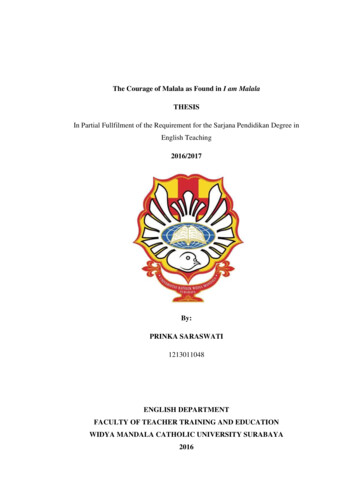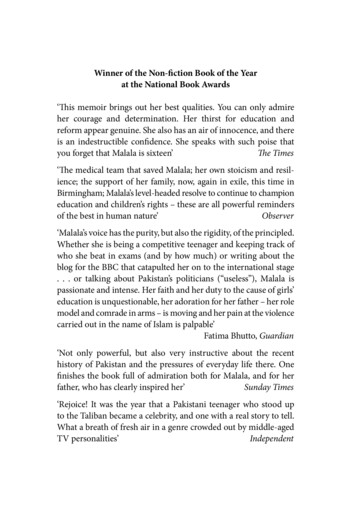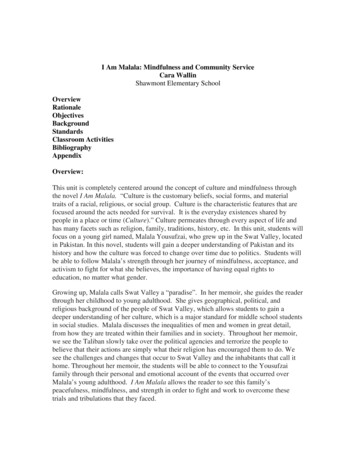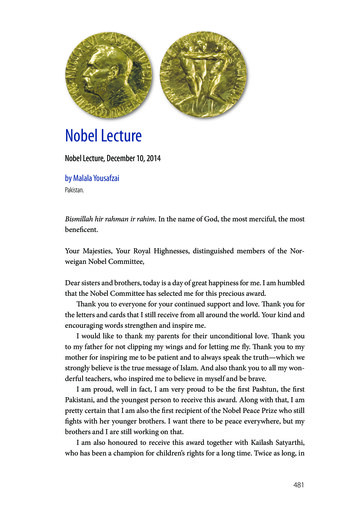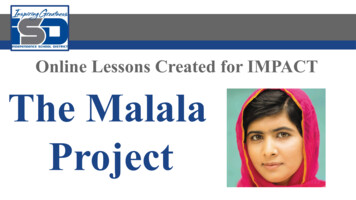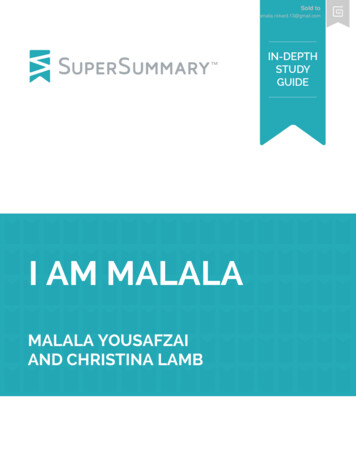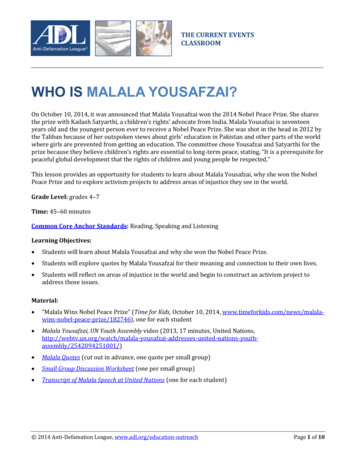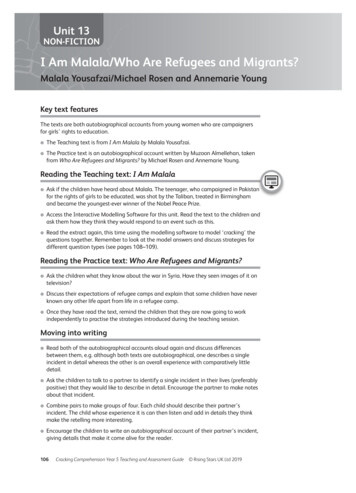
Transcription
Unit 13 NON-FICTIONNON-FICTIONI Am Malala/Who Are Refugees and Migrants?Malala Yousafzai/Michael Rosen and Annemarie YoungKey text featuresThe texts are both autobiographical accounts from young women who are campaignersfor girls’ rights to education.llThe Teaching text is from I Am Malala by Malala Yousafzai.The Practice text is an autobiographical account written by Muzoon Almellehan, takenfrom Who Are Refugees and Migrants? by Michael Rosen and Annemarie Young.Reading the Teaching text: I Am MalalalllAsk if the children have heard about Malala. The teenager, who campaigned in Pakistanfor the rights of girls to be educated, was shot by the Taliban, treated in Birminghamand became the youngest-ever winner of the Nobel Peace Prize.Access the Interactive Modelling Software for this unit. Read the text to the children andask them how they think they would respond to an event such as this.Read the extract again, this time using the modelling software to model ‘cracking’ thequestions together. Remember to look at the model answers and discuss strategies fordifferent question types (see pages 108–109).Reading the Practice text: Who Are Refugees and Migrants?lllAsk the children what they know about the war in Syria. Have they seen images of it ontelevision?Discuss their expectations of refugee camps and explain that some children have neverknown any other life apart from life in a refugee camp.Once they have read the text, remind the children that they are now going to workindependently to practise the strategies introduced during the teaching session.Moving into writingllllRead both of the autobiographical accounts aloud again and discuss differencesbetween them, e.g. although both texts are autobiographical, one describes a singleincident in detail whereas the other is an overall experience with comparatively littledetail.Ask the children to talk to a partner to identify a single incident in their lives (preferablypositive) that they would like to describe in detail. Encourage the partner to make notesabout that incident.Combine pairs to make groups of four. Each child should describe their partner’sincident. The child whose experience it is can then listen and add in details they thinkmake the retelling more interesting.Encourage the children to write an autobiographical account of their partner’s incident,giving details that make it come alive for the reader.106 Cracking Comprehension Year 5 Teaching and Assessment Guide Rising Stars UK Ltd 2019452619 U13 CC 2e Y5 106-115.indd 10605/02/19 1:20 PM
Unit 13 NON-FICTIONListening Comprehension:Questions and AnswersThe listening comprehension questions can be accessed on the modelling software for this unit.Q1:Why have people around the world heard about Malala? Use reasons fromthe text in your answer.A1:She was targeted and shot by the Taliban./She was campaigning for girls toreceive education in Pakistan.Strategy: Consider what is special about Malala that makes her different from other girls.Q2:What does “bounced along” tell you about the streets in Mingora?A2:Accept either of the following answers. The roads were not smooth./The roads were potholed. The traffic was stop–start so they kept bouncing to a stop.Strategy: Decide which part of the text the answer will be in. Listen carefully to thatpart of the text, thinking about the question.Q3:Why do you think there is an army checkpoint on the route?A3:Because there are terrorists around/To keep people safe from terroristsStrategy: Decide which part of the text the answer will be in. Listen carefully to thatpart of the text, thinking about the question.Extending readingGoodnight Mister Tom – Michelle MagorianOranges in No Man’s Land – Elizabeth LairdShadow – Michael MorpurgoThe Bone Sparrow – Zana FraillonCracking Comprehension Year 5 Teaching and Assessment Guide Rising Stars UK Ltd 2019 452619 U13 CC 2e Y5 106-115.indd 10710705/02/19 1:20 PM
452619 U13 CC 2e Y5 106-115.indd 1085.4.3.2.army checkpointcrowded streetsLittle Giants factorystreamcrowded streetsLittle Giants factorystream2413 The story is told through her eyes, but shedoesn’t remember these events herself andis telling you what other people have toldher. She wants the reader to know that shedoesn’t remember these events because ofher injuries.Strategies:1 mark Carefully read the question, marking key words. Scan the whole text for each of the places described. Number the places, then check your answer against the text.Question focus: summarise main ideas from more than one paragraph. Carefully read the question, marking key words. Scan the paragraph indicated, looking for things that Malala doesn’tremember or hear. Carefully read the relevant sentences. Consider the impact of Malala telling the reader that she doesn’t rememberthese events.Strategies:Question focus: identify how meaning is enhanced through choice of wordsand phrases. Carefully read the question, marking key words. Scan the paragraph indicated, looking for events. Carefully read the relevant sentences, considering the question.Strategies:Question focus: identify key details from non-fiction. Scan the text for the word dyna. Carefully read the sentences around the word to make your decision. Scan the rest of the text for additional evidence.Strategies:2c1 mark2g1 mark The road became quiet.The bus slowed to a halt.Two men got onto the dyna.Malala was shot.2bAccept any two of: The journey happens during rush hour. The young man asked if this was theKhushal School bus.(b) Evidence includes:1 mark home from school to (Khushal) schoolQuestion focus: explain and justify inferences with evidence from the text. Carefully read the question, marking key words. Scan the paragraph indicated, looking for a word that has the samemeaning as in the question. Carefully read the sentence to confirm what the word means in this context.Strategies:2darmy checkpointNumber the places from 1 to 4 toshow the order in which the dynapassed them.Why does Malala tell you that shedoesn’t remember, and didn’thear, some of the events?Look at the paragraph beginning“Just after ”.List two things.What happened that was unusual?Look at the paragraph beginning“Just after ”.b) What evidence from the textgives you the information?a) Where do you think Malala wasgoing on the dyna?Find and copy one word that tellsyou the stream smelled bad.Question focus: explain the meaning of words in context.1 markUseful strategiesCracking the questions2aCD/Mark(a) Accept either one of:“stench”1.Look at the paragraph beginning“It was hot and sticky ”.AnswerQuestionTeaching text: I Am MalalaUnit 13 NON-FICTION108 Cracking Comprehension Year 5 Teaching and Assessment Guide Rising Stars UK Ltd 201905/02/19 1:20 PM
6.How do you think Malala felt at the Accept answers similar to:end of this extract when she woke scared because she was seeing double andup? Give evidence from the text todidn’t know where she was or anyone aroundsupport your answer.her relieved because she was still aliveStrategies:2 marks452619 U13 CC 2e Y5 106-115.indd 109Award 1 mark for an appropriate emotion.Award 2 marks for an appropriate emotion and evidence to support theemotion. Carefully read the question, marking key words. Carefully read the relevant part of the text, considering the question. Use your own response to determine what you think Malala mighthave felt. Either find and copy or paraphrase information from the text to supportyour answer.Question focus: explain and justify inferences with evidence from the text.2dUnit 13 NON-FICTIONCracking Comprehension Year 5 Teaching and Assessment Guide Rising Stars UK Ltd 2019 10905/02/19 1:20 PM
Unit 13 NON-FICTIONWho Are Refugees and Migrants?Michael Rosen and Annemarie Young1The war in Syria began in 2011 when protesters marched to demand democracy,but the government fought back. Since then, more than 5 million Syrians havebecome refugees, over 1 million of whom live in camps in Jordan. MuzoonAlmellehan is a Syrian refugee, now living in the UK.5I am only one girl but, like all girls, I have dreams. My dream is to go touniversity and to be a journalist. When I am a journalist, I want to tell thestories of different people and different countries, so we can work together.8Before the war, we lived in Dara’a in Syria where my father was a teacher.I loved to go to school. But when war came he could not go to work andgoing to school was too dangerous. Sometimes there was no food. So wewent across the border to the kingdom of Jordan, which gave safety to usand many other families.13In Jordan, we lived in two refugee camps. Life was not easy, but I was luckybecause I was in camps where there were schools. I am also lucky because Ihave parents who believe in education, especially for their daughters.16We need education because Syria needs us. Syria needs engineers andteachers, doctors and journalists. If young people are not educated, who willrebuild the country? Without us, who will build peace?19I share the same message as my friend Malala: Education is power.Education is the future. Education makes us who we want to be.21Some people call us the Lost Generation. We are not lost. We have not lostour love of learning. We have not lost the dreams for our future.23We have not lost hope. Syria will never be the same as it was before the war.I hope it can be better.25One day, when I am a journalist,there is a story I want to write. Iwant to write the story of how allthe Syrian children came home tolift up their country.30I hope that story starts now.110 Cracking Comprehension Year 5 Teaching and Assessment Guide Rising Stars UK Ltd 2019 452619 U13 CC 2e Y5 106-115.indd 110You may photocopy this page05/02/19 1:20 PM
Unit 13 NON-FICTIONName:1Class:Date:Look at the paragraph beginning “In Jordan ”.What made Muzoon think she was lucky when she was in Jordan? Tick one.Life was easy.Her parents were with her.2 She could go to school.There was plenty of food. 2b1 mark“If young people are not educated, who will rebuild the country?”Find and copy a group of words from the paragraph beginning “One day ” that means thesame as “rebuild” in this sentence.2a1 mark32bWhat does Muzoon think is the most important thing for the children of Syria?1 mark42gWhy might some people call Syria’s children “the Lost Generation”?1 mark5Find and copy two reasons why Muzoon does not think they are “the Lost Generation”.2b1 mark6Look at the paragraph beginning “One day ”.2fHow do the ideas at the end of this text link back to the beginning of the text?1 mark7Which of the following would be the most suitable summary of the whole text? Tick one.Girls and boys need dreams.Education is important for girls.Journalists write interesting stories.Syria’s children can rebuild the country. 2c1 markCracking Comprehension Year 5 Teaching and Assessment Guide Rising Stars UK Ltd 2019 You may photocopy this page 452619 U13 CC 2e Y5 106-115.indd 11111105/02/19 1:20 PM
Unit 13 NON-FICTIONName:8Class:Date:Using information from the text, tick one box in each row to show whether each statement istrue or false for Muzoon.TrueFalseShe wants to be a journalist and write about her experiences.She thinks education is important for everyone.She wants to live and work in the UK.2bShe hopes that Syria can be rebuilt.92 marksDo you think Muzoon will return to Syria when she finishes her education, if it is safe to do so?Tick one.Yes No Explain your answer using ideas and evidence from the text.2e1 mark112 Cracking Comprehension Year 5 Teaching and Assessment Guide Rising Stars UK Ltd 2019 452619 U13 CC 2e Y5 106-115.indd 112You may photocopy this page05/02/19 1:20 PM
452619 U13 CC 2e Y5 106-115.indd 113 Many of them no longer live in Syria and soare lost to Syria. If they have not been educated, theycannot become doctors, engineers, teachers,journalists. Many children will grow up not knowingwhat it is like to live without war, so theymay find it hard to live in peacetime.Why might some people call Syria’s Accept an answer that recognises one of thechildren “the Lost Generation”?following.4.education“lift up”What does Muzoon think is themost important thing for thechildren of Syria?Find and copy a group of wordsfrom the paragraph beginning“One day ” that means the sameas “rebuild” in this sentence.“If young people are not educated,who will rebuild the country?”There was plenty of food.She could go to school.Her parents were with her.Life was easy.What made Muzoon think she waslucky when she was in Jordan?Tick one.3.2. She could go to school.1.Look at the paragraph beginning“In Jordan ”.AnswerQuestionPractice text: Who Are Refugees and Migrants?Strategies:Strategies:1 mark1 mark2gStrategies:1 markCracking Comprehension Year 5 Teaching and Assessment Guide Rising Stars UK Ltd 2019 Carefully read the question, marking key words. Scan the text for the phrase “the Lost Generation”. Carefully read the relevant part of the text, considering what is implied bythe phrase. Base your answer on ideas in the text.Strategies:Question focus: identify how meaning is enhanced through choice of wordsand phrases. Carefully read the question, marking key words. Consider where in the text you might find the answer to the question. Carefully read the relevant sentences, considering the question.Question focus: identify key details from non-fiction.2b Carefully read the question, marking key words. Scan the paragraph indicated for words that mean the same as “rebuild”. Carefully read the surrounding text, confirming what the words mean intheir context.Question focus: explain the meaning of words in context.2a Carefully read the question, marking key words. Carefully read the paragraph indicated. Read the options given in the question and reread the paragraph, thinkingabout what Muzoon says.Question focus: retrieve and record information.1 markUseful strategies2bCD/MarkCracking the questionsUnit 13 NON-FICTION11305/02/19 1:20 PM
452619 U13 CC 2e Y5 106-115.indd 114 7.Look at the paragraph beginning“One day ”.6.Syria’s children can rebuild thecountry.Journalists write interesting stories.Education is important for girls.Girls and boys need dreams.Which of the following would bethe most suitable summary of thewhole text? Tick one.How do the ideas at the end of thistext link back to the beginning ofthe text?Find and copy two reasons whyMuzoon does not think they are“the Lost Generation”.5.“We are not lost.”“We have not lost our love of learning.”“We have not lost the dreams for our future.”“We have not lost hope.”Syria’s children can rebuild the country.Muzoon is talking about being a journalist/writing stories. Accept any two of:Carefully read the question, marking key words.Scan the text for the information.Carefully read the surrounding text to confirm your answer.Remember to find and copy two reasons.Carefully read the question, marking key words.Carefully read the text, thinking about its meaning.Consider each of the statements separately.Tick the statement that best matches your understanding of the text.Strategies: Question focus: summarise main ideas from more than one paragraph.1 mark Carefully read the question, marking key words. Carefully reread both parts of the text. Look for similar themes in both parts of the text.Strategies:Question focus: explain how information is related and contributes tomeaning as a whole.Do not award the mark if the sentiments have been paraphrased.Award 1 mark for two reasons. Strategies:Question focus: retrieve and record information.2c1 mark2f1 mark2bUnit 13 NON-FICTION114 Cracking Comprehension Year 5 Teaching and Assessment Guide Rising Stars UK Ltd 201905/02/19 1:20 PM
452619 U13 CC 2e Y5 106-115.indd 115 Yes. She thinks that Syria needs its children tohelp rebuild it. NoExplain your answer using ideasand evidence from the text.YesTick one.Do you think Muzoon will returnto Syria when she finishes hereducation, if it is safe to do so?9.Yes. She thinks journalists will be importantto tell the story of how Syria’s children “camehome to lift up their country”. She hopes that Syriacan be rebuilt.She hopes that Syriacan be rebuilt. She wants to live andwork in the UK.She wants to live andwork in the UK. FalseShe thinks educationis important foreveryone.TrueShe thinks educationis important foreveryone.FalseShe wants to be ajournalist and writeabout her experiences.TrueUsing information from the text,tick one box in each row to showwhether each statement is true orfalse for Muzoon.She wants to bea journalist andwrite about herexperiences.8.Strategies:2 marksNo mark is awarded for the first part of the answer.Carefully read the question, marking key words.Skim-read the whole text, considering the question.Scan the text for information that might be useful.Carefully read the relevant sections of the text.Find or paraphrase information from the text to support your answer.Strategies:1 mark Question focus: predict what might happen from details stated and implied.2eAward 1 mark for three answers correct.Award 2 marks for all four answers correct. Carefully read the question, marking key words. Skim read the text, considering each of the statements separately. Tick the box that best matches your understanding of the text.Question focus: retrieve and record information.2bUnit 13 NON-FICTIONCracking Comprehension Year 5 Teaching and Assessment Guide Rising Stars UK Ltd 2019 11505/02/19 1:20 PM
Reading the Teaching text: I Am Malala l Ask if the children have heard about Malala. The teenager, who campaigned in Pakistan for the rights of girls to be educated, was shot by the Taliban, treated in Birmingham and
